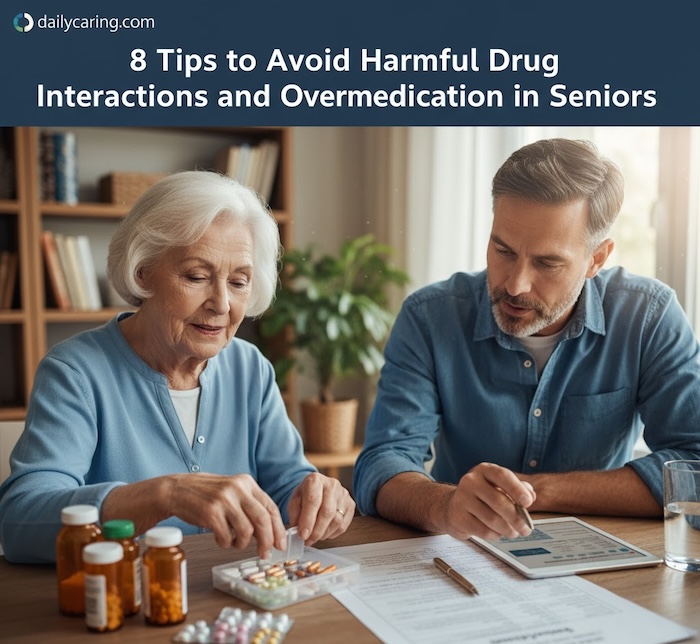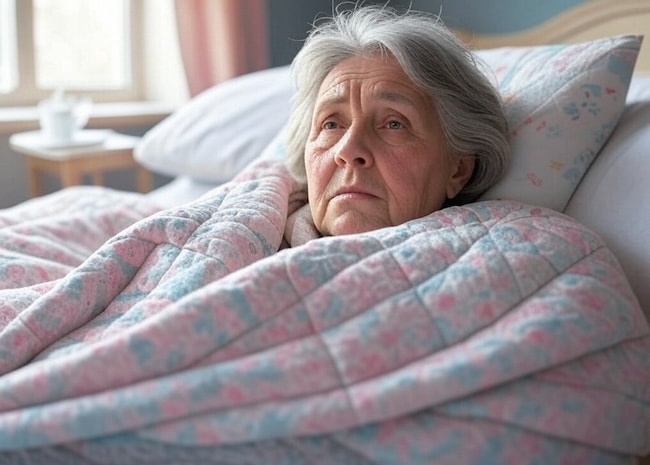For many family caregivers, the day-to-day work of caring for a loved one defines life completely. The schedule, responsibilities, and emotional focus revolve around that one role. When caregiving ends, it can feel like the ground shifts beneath you.
“After years of tending to a parent, spouse, or family member, the end of caregiving can bring both relief and heartbreak. Former caregivers describe deep loneliness and exhaustion, others a fragile sense of peace, but all share one truth: caregiving changes everything.” – Amie Clark, BSW
When DailyCaring asked readers how they reconnected with themselves and the outside world after caregiving ended, dozens of former caregivers replied with remarkable honesty. Their reflections revealed a mix of loss, gratitude, and the quiet, determined work of rebuilding a new identity.
Books for Life After Caregiving
Looking for resources? We gathered this short list of books for life after caregiving that you can order from Amazon.
| After Caregiving Ends, A Guide to Beginning Again | Caregiver Recovery Journal |
| What No One Told Me About Watching Them Die | After All, It Was My Honor: A Daughter's Caregiving Chronicles |
*Daily Caring may receive commissions for purchases made through links in this article.
Losing a Sense of Identity
Many former caregivers shared that they no longer recognize the person they used to be. Years of focusing on a family member’s needs left them unsure of what comes next.
“I’m not the same person I was when I started caring. My stamina is reduced, my interests have changed, and I feel disoriented even in familiar places.”
Caregiving often becomes not just what you do, but who you are. When it ends, there’s a silence where purpose used to be, a void that can be difficult to fill. Rebuilding a new identity takes time, reflection, and patience.
Grief Comes in Layers
Nearly every person described ongoing grief, especially after caring for more than one loved one.
“I lost my parents and then my wife within a few years. I don’t know if caregiver PTSD applies, but the grief stacks up.”
Others admitted to feeling a sense of relief when their loved one’s suffering ended, followed by guilt for that feeling.
Both emotions can coexist. Relief doesn’t mean a lack of love; it’s a normal part of the grieving process when exhaustion, sadness, and compassion overlap.
Faith, reflection, or even journaling can help bring clarity during these moments of transition.
When the World Feels Foreign
After years centered on someone else’s needs, everyday life can seem unfamiliar.
“A trip to the city feels like an overseas vacation, everything has changed.”
The pace of everyday life can feel too fast, conversations too trivial, routines too empty. This emotional disconnect can lead to loneliness, depression, and uncertainty about how to start again.
Seeking support networks or talking with a counselor can be a form of therapy that eases the shift back into community life.
Small Steps Toward Reconnection
Some former caregivers found comfort in volunteering, joining support groups or grief groups, or helping new caregivers.
“I started volunteering at a senior center. It gave me purpose again.”
“A Zoom grief group for spouses has been my lifeline.”
Even when motivation is low, small actions, such as attending a class, reconnecting with old friends, or reviving hobbies, can help reopen the world beyond caregiving. Self-compassion and consistent self-care are essential tools for healing and rediscovering who you are.
Faith, Purpose, and Meaning
Several people said their hospice team, faith community, or spiritual practices carried them through the most challenging moments. Others are finding meaning in sharing their caregiving experience with survivors and those facing similar experiences.
“My faith and relationship with God have carried me.”
“I now advise friends just starting their caregiving journey, it gives my experience meaning.”
For many, reflection brings perspective and a deeper appreciation for resilience, patience, and the bonds created through caregiving. Reconnection often begins with finding new goals and honoring what caregiving taught you.
Finding the Next Chapter
There’s no single timeline for recovery after caregiving. Some are still in the thick of grief; others are taking tentative steps toward new routines. But across all the responses we received, one truth stood out: caregiving changes you forever, and that’s not entirely a loss.
The compassion, patience, and empathy built during the caregiving experience remain part of who you are. They become the foundation for your next stage of growth.
If you’re searching for additional resources, from mental health programs to community support networks, know that these are designed to help you rebuild purpose and connection one step at a time.
VIDEO: Life After Caregiving: These Are Their Stories
Helpful Resources for Former Caregivers
Many organizations offer guidance, mental health support, and opportunities to connect with others who’ve had similar experiences.
Trusted resources can help you process your grief, rebuild your sense of purpose, and take practical steps toward your next chapter.
The following nationwide organizations and programs offer emotional, practical, and mental health support to people rebuilding their lives after caregiving.
- Family Caregiver Alliance (FCA)
caregiver.org
Offers free online support groups, fact sheets on life after caregiving, and emotional-health resources for those coping with loss, loneliness, and changing identity. - Caregiver Action Network (CAN)
caregiveraction.org
Includes resources and tools to help current and former caregivers reflect on their caregiving experience, manage depression, and set new goals. - National Alliance for Caregiving (NAC)
caregiving.org
Provides research, advocacy updates, and resources to improve support networks and services for caregivers and former caregivers nationwide. - Eldercare Locator (HHS Administration for Community Living)
eldercare.acl.gov
A free federal service that connects users to local grief counseling, volunteer programs, senior centers, and mental health services. - Alzheimer’s Association
alz.org
Supports caregivers and caregiver survivors after a loved one’s death through support groups, one-on-one counseling, and online forums for people with similar experiences. - Hospice Foundation of America
hospicefoundation.org
Provides guidance on the grieving process and educational webinars on life after caregiving, grief therapy, and self-care for hospice family members. - National Institute of Mental Health (NIMH)
nimh.nih.gov
Reliable information on recognizing depression, coping with sadness and loneliness, and finding licensed mental-health professionals nationwide. - AARP Caregiving Resource Center
aarp.org/caregiving
Articles, webinars, and online discussions about adjusting to post-caregiving life, managing finances, and reconnecting with hobbies and friendships. - The Conversation Project
theconversationproject.org
Helps families reflect on the caregiving experience and continue meaningful conversations about legacy, grief, and honoring loved ones’ wishes. - National Council on Aging (NCOA)
ncoa.org
Offers access to benefits, community programs, and support services that help caregivers transition into new roles and explore additional self-care resources. - The Mighty – Caregivers Community
themighty.com
An online journal-style platform where caregivers and former caregivers share reflections, insight, and personal essays on healing and rediscovery. - What’s Your Grief
whatsyourgrief.com
Created by mental-health professionals, this site explores grief therapy, coping tools, and rebuilding purpose through journaling, perspective, and self-reflection. - GriefShare
griefshare.org
Faith-based support groups across the U.S. offering 13-week programs for survivors adjusting to life after loss. Meetings available in person and online. - Modern Loss
modernloss.com
A supportive online community offering essays, podcasts, and digital events for anyone navigating post-loss identity and meaning. - Psychology Today – Find a Therapist
psychologytoday.com/us/therapists
A nationwide directory to find grief, trauma, or life-transition specialists who understand caregiver burnout and post-caregiving adjustment. - Hilarity for Charity (HFC)
wearehfc.org
A national non-profit on a mission to care for families impacted by Alzheimer’s disease, activate the next generation of Alzheimer’s advocates, and be a leader in brain health research and education.
A Shared Path Forward
If you’re a former caregiver, know that you’re not alone in feeling lost, tired, or unsure of your next step. The transition after caregiving is its own form of healing. A process of honoring what was and slowly building what’s ahead.
At DailyCaring, we’re honored to continue sharing your insights, reflections, and wisdom with others who are learning how to live again after caregiving. Together, we’re finding strength, clarity, and a renewed sense of meaning in the life that follows caregiving.
Are you a former caregiver? Do you have a story or advice for fellow caregivers? Leave your comment below, our community thanks you!
About the Author

Amie Clark is a senior care expert with over 25 years of experience in aging services, caregiving, and senior housing. She combines her professional expertise and personal caregiving insight to help families navigate aging, long-term care, and end-of-life decisions with clarity and compassion.














My husband and I took care of my mom for 5 years when she had Alzheimer’s. During this time, I tried to “retain a sense of self.” By that, I mean that when I had a few minutes to spare, I did things that I liked: I exercised (which was inherent in my caregiving role, since my mom she liked to walk/wander),and I exercised my write to write. Regarding the latter, I jotted down the funny, the not-so-funny, and everything in-bewtween, regarding what transpired in my life as a caregiver.
These anecdeotes coalesced into a book entitled, “My Mother Has Alzheimer’s and My Dog Has Tapeworms: A Caregiver’s Tale.” I thought of the title when I was driving home from work one day, and I realized that my once broad life,was reduced to the pressing health concerns of my mom and dog. I tried to write it with humor and heart, since you need both in life, and particularly when dealing with Alzheiemr’s. When my mom wanted to tell someone that she had pounded the pavement, looking for a job (accounting) in NY after college, but what she said was, “I walked the streets of NY, if you know what I mean,” I knew I had to start writing this stuff down. (My mom might have been a sweet talker, but she wasn’t a street walker.)
I’d encourage other caregivers to pursue or take up a new hobby to combat the stress of caregiving. Maybe you could paint or draw for example. Maybe the person with Alzheimer’s could do the same. Best of luck to all the caregivers out there. R. Lynn Barnett
Wow, thank you for sharing this! I would love to read your book, is it available in bookstores or online? If so, please share! Also, thank you for your advice to other caregivers, very well said.- Amie
I was married to my soulmate for 35 years, and was her sole caregiver for her last 7 years as her mind and body deteriorated from a rare, progressive, untreatable, incurable brain disease. She finally died in March, 2025, and in addition to experiencing “all of the above” issues in your article, we were so close for our entire marriage that the “Who am I now” issue is especially significant to me. I’m still working on that one.
Jack, I’m so sorry to hear about your wife, thank you for sharing. This will help countless former caregivers who are feeling the same way know that they are not alone. Best wishes to you. -Amie
I was not a natural born caregiver, I always said I would rather do anything than being a nurse. I live with guilt that in the midst of my caregiving, I was not as kind as my husband. I am working on being kinder in this world to other people, but it does not erase how I feel about myself even though I took care of all the household and his many medical appointments and the Care it took of him afterwards. I wish there was a book to help me through guilt after the death of my spouse.
Linda, your feelings of guilt are very natural and we had multiple people respond that they felt guilt after the passing of their loved one for various reasons. I know it’s easy to beat up on ourselves, you should take comfort in knowing that you did so many wonderful and supportive things for him. If it’s helpful, we did compile a list of books about this topic, you can see the Amazon list here–> https://amzn.to/43Y526V Best, Amie
I cared for my husband for three years. He was my total focus Although I was not homebound and was able to participate in the gym and some of my other activities.
What I learned was after he passed the things that worked for him, and I did not work for me anymore. The biggest change was our church. We attended church regularly and we were both very involved in our church for years serving in all capacities, but after he passed, I realized that my church was not serving my needs anymore and I would’ve never made that change or even realized it while he was alive.
After you lose your loved one, you do start rethinking a lot of things and realize that your focus was on them and what they wanted and you really didn’t think about what you wanted or what you needed but now as a widow, I am starting to take care of myself and one of the first changes I made was to leave a church that he and I had been in for 48 years. What worked for both of you doesn’t always work for you as a widow.
Hi Pat, thank you for sharing this experience. I imagine that must have been such a difficult thing to do (leave your church), but you are so right. Once the focus is off the other person and act of being a full-time caregiver, you are able to focus on yourself. New interests, hobbies, and even different values may come to light. I’m so glad to hear you are focusing on you, you absolutely deserve that. Best wishes, Amie
Thank you for providing valuable information on a topic ignored up to now. I was the sole caregiver for my parents for 15 years. Now that they both have passed, what is my identity, my purpose?
I struggled for months trying to figure out what to do with the rest of my life. I’m also concerned about my own future as I eventually need caregiving myself. But I’m reassured knowing the resources to help solve my future problems. I’ve made new friends, found new activities and a new peace. I’m happy to discover there is life after caregiving.
Thank you for sharing Beverly, your caregiving journey is inspiring! I’m so glad to hear that you have found your stride as a former caregiver and that you have found these resources helpful. Best wishes to you. – Amie
This is beautiful—special thanks to all who shared their stories.